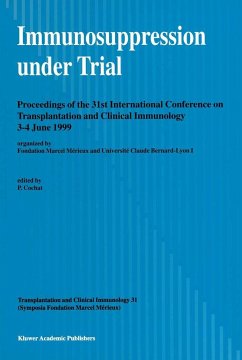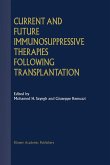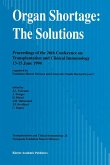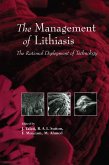Conference On Transplantation and Clinical Immunology, P. Cochat, J. Traeger, C. Merieux, Conference on Transplantation and Clinic, Fondation Marcel Merieux
Immunosuppression Under Trial
Herausgegeben:Cochat, Pierre
Conference On Transplantation and Clinical Immunology, P. Cochat, J. Traeger, C. Merieux, Conference on Transplantation and Clinic, Fondation Marcel Merieux
Immunosuppression Under Trial
Herausgegeben:Cochat, Pierre
- Gebundenes Buch
- Merkliste
- Auf die Merkliste
- Bewerten Bewerten
- Teilen
- Produkt teilen
- Produkterinnerung
- Produkterinnerung
Immunosuppression in solid organ transplantation is currently experiencing a worldwide revival since new drugs are now available and others are under development. In order to contribute to the design of future strategies, a critical approach of surrogate endpoints is given and long-term side effects are analysed, together with the impact of non-compliance, quality-of-life and economical parameters. In this book, international specialists have set up the scientific rationale and provided new bases for further immunosuppressive strategies.
Andere Kunden interessierten sich auch für
![Current and Future Immunosuppressive Therapies Following Transplantation Current and Future Immunosuppressive Therapies Following Transplantation]() M.H. Sayegh / Giuseppe Remuzzi (Hgg.)Current and Future Immunosuppressive Therapies Following Transplantation158,99 €
M.H. Sayegh / Giuseppe Remuzzi (Hgg.)Current and Future Immunosuppressive Therapies Following Transplantation158,99 €![Therapeutic Immunosuppression Therapeutic Immunosuppression]() Angus W ThomsonTherapeutic Immunosuppression61,99 €
Angus W ThomsonTherapeutic Immunosuppression61,99 €![The Composition of the Urine: In Health and Disease, and Under the Action of Remedies The Composition of the Urine: In Health and Disease, and Under the Action of Remedies]() Edmund Alexander ParkesThe Composition of the Urine: In Health and Disease, and Under the Action of Remedies36,99 €
Edmund Alexander ParkesThe Composition of the Urine: In Health and Disease, and Under the Action of Remedies36,99 €![Organ Transplantation 1990 Organ Transplantation 1990]() George J M AbounaOrgan Transplantation 1990295,99 €
George J M AbounaOrgan Transplantation 1990295,99 €![Organ Shortage: The Solutions Organ Shortage: The Solutions]() J L TouraineOrgan Shortage: The Solutions61,99 €
J L TouraineOrgan Shortage: The Solutions61,99 €![The Management of Lithiasis The Management of Lithiasis]() J. TalatiThe Management of Lithiasis61,99 €
J. TalatiThe Management of Lithiasis61,99 €![Amyloid and Amyloidosis 1990 Amyloid and Amyloidosis 1990]() Natvig Jacob EdAmyloid and Amyloidosis 199093,99 €
Natvig Jacob EdAmyloid and Amyloidosis 199093,99 €-
-
-
Immunosuppression in solid organ transplantation is currently experiencing a worldwide revival since new drugs are now available and others are under development. In order to contribute to the design of future strategies, a critical approach of surrogate endpoints is given and long-term side effects are analysed, together with the impact of non-compliance, quality-of-life and economical parameters. In this book, international specialists have set up the scientific rationale and provided new bases for further immunosuppressive strategies.
Produktdetails
- Produktdetails
- Transplantation and Clinical Immunology 31
- Verlag: Springer Netherlands / Springer, Berlin
- 1999.
- Seitenzahl: 192
- Erscheinungstermin: 31. Mai 1999
- Englisch
- Abmessung: 241mm x 160mm x 17mm
- Gewicht: 403g
- ISBN-13: 9780792358046
- ISBN-10: 079235804X
- Artikelnr.: 21552202
- Herstellerkennzeichnung
- Libri GmbH
- Europaallee 1
- 36244 Bad Hersfeld
- gpsr@libri.de
- Transplantation and Clinical Immunology 31
- Verlag: Springer Netherlands / Springer, Berlin
- 1999.
- Seitenzahl: 192
- Erscheinungstermin: 31. Mai 1999
- Englisch
- Abmessung: 241mm x 160mm x 17mm
- Gewicht: 403g
- ISBN-13: 9780792358046
- ISBN-10: 079235804X
- Artikelnr.: 21552202
- Herstellerkennzeichnung
- Libri GmbH
- Europaallee 1
- 36244 Bad Hersfeld
- gpsr@libri.de
Preface. Part 1: Setting the stages in clinical trials. 1. Current results as reference for future improvements in immunosuppression; G. Opelz, et al. 2. Rationale of clinical trials from the physician; C. Legendre. 3. Minimal standards for reporting clinical trial results in transplantation; B.L. Kasiske, H. Chakkera. 4. Methodological approach of clinical trials for renal transplantation; P. Landais, J.P. Jais. Part 2: Is acute rejection an appropriate surrogate marker? 5. Surrogate end-points for clinical trials in renal transplantation; B.L. Kasiske. 6. Is acute rejection an appropriate surrogate marker for clinical trials in liver transplantation? O. Farges. 7. The success of clinical immunosuppressive trials in heart transplantation: the early detection of acute rejection; M. Antoine. Part 3: Towards long-term end-points. 8. Factors influencing long-term allograft survival; C. Van Buren. Part 4: Can we minimize the long-term side-effects? 9. Patients' appraisal of side-effects in quality of life assessments of immunosuppressive regimens; P. Moons, et al. 10. Cardiovascular complications after renal transplantation; V. Schwenger, et al. 11. Strategies to minimize nephrotoxicity associated with calcineurin inhibitors; J. Alsina. 12. Diabetogenic effect of immunosuppressive drugs; X. Martin. 13. Can we minimize long-term side effects of immunosuppressive drugs on lipid metabolism? Z.A. Massy. 14. Can we minimize the long-term side-effects of immunosuppressive drugs in pediatric patients? B. Tönshoff, et al. Part 5: Strategies. 15. Induction therapy; D. Abramowicz, K.M. Wissing. 16. Effect of long-term immunosuppression in kidney-graft recipients on cancer incidence: randomised comparison of two cyclosporin regimens; J. Dantal, et al. 17. Immunosuppression in composite tissue transplantation; J.-M. Dubernard, et al. 18. The search for immunosuppressive synergy; C. Van Buren. 19. Economic analysis of immunosuppression in transplantation: a review of recent studies in liver and kidney transplantation; J. Hutton. Part 6: Clinical trials for at-risk situations. 20. Questions raised by the exclusion of `at risk' conditions from current trials in organ transplantation; J.P. Revillard, et al. List of contributors.
Preface. Part 1: Setting the stages in clinical trials. 1. Current results as reference for future improvements in immunosuppression; G. Opelz, et al. 2. Rationale of clinical trials from the physician; C. Legendre. 3. Minimal standards for reporting clinical trial results in transplantation; B.L. Kasiske, H. Chakkera. 4. Methodological approach of clinical trials for renal transplantation; P. Landais, J.P. Jais. Part 2: Is acute rejection an appropriate surrogate marker? 5. Surrogate end-points for clinical trials in renal transplantation; B.L. Kasiske. 6. Is acute rejection an appropriate surrogate marker for clinical trials in liver transplantation? O. Farges. 7. The success of clinical immunosuppressive trials in heart transplantation: the early detection of acute rejection; M. Antoine. Part 3: Towards long-term end-points. 8. Factors influencing long-term allograft survival; C. Van Buren. Part 4: Can we minimize the long-term side-effects? 9. Patients' appraisal of side-effects in quality of life assessments of immunosuppressive regimens; P. Moons, et al. 10. Cardiovascular complications after renal transplantation; V. Schwenger, et al. 11. Strategies to minimize nephrotoxicity associated with calcineurin inhibitors; J. Alsina. 12. Diabetogenic effect of immunosuppressive drugs; X. Martin. 13. Can we minimize long-term side effects of immunosuppressive drugs on lipid metabolism? Z.A. Massy. 14. Can we minimize the long-term side-effects of immunosuppressive drugs in pediatric patients? B. Tönshoff, et al. Part 5: Strategies. 15. Induction therapy; D. Abramowicz, K.M. Wissing. 16. Effect of long-term immunosuppression in kidney-graft recipients on cancer incidence: randomised comparison of two cyclosporin regimens; J. Dantal, et al. 17. Immunosuppression in composite tissue transplantation; J.-M. Dubernard, et al. 18. The search for immunosuppressive synergy; C. Van Buren. 19. Economic analysis of immunosuppression in transplantation: a review of recent studies in liver and kidney transplantation; J. Hutton. Part 6: Clinical trials for at-risk situations. 20. Questions raised by the exclusion of `at risk' conditions from current trials in organ transplantation; J.P. Revillard, et al. List of contributors.









